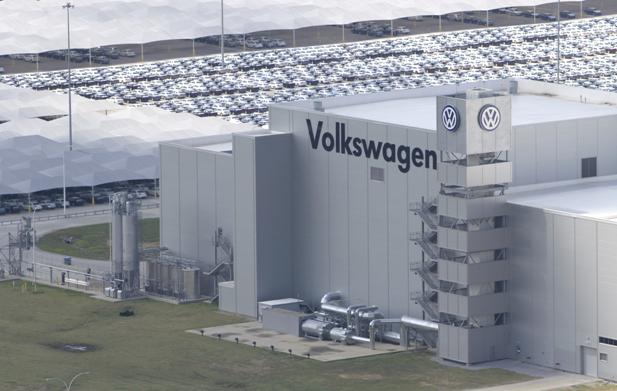Later this month, at Volkswagen's Chattanooga plant, a massive layoff will occur. As a result of slower-than-expected growth in Passat sales, about 500 Chattanooga-area workers will find themselves jobless, most not knowing how - or when - they'll get their next paycheck.
The VW layoffs are just the latest in a long line of examples of failed corporate welfare handout schemes that have left workers without jobs and taxpayers holding the tab.
In an attempt to lure - some would use the term "bribe" - new businesses, state and local governments have increasingly relied on a cocktail of tax breaks, free land, training grants, infrastructure handouts and giveaways of cold, hard cash. With states battling against one another to land employment hubs such as business headquarters, manufacturing plants and distribution centers, a race has developed. Unfortunately, it is a race to see which state can lavish very wealthy, well-connected companies with the most incentives in exchange for jobs. Those incentives, of course, are funded with our tax dollars, and they rarely result in the promised number of jobs or the anticipated long-term economic benefits.
The VW plant that is laying off 500 employees is the same VW plant that is the recipient of $577.4 million in government giveaways, the largest incentive package for any auto plant in U.S. history. The incentives included more than $350 million in state and local tax breaks; $81 million worth of land, courtesy of city and county taxpayers; $43 million worth of federal and state-funded road improvements; $36 million in state money for worker training and a training center; and $3.5 million in rail line upgrades, financed by state and local tax dollars.
And less than five years later, what do we have to show for more than half a billion dollars in handouts? Pink slips. Five hundred of them.
Unfortunately, the VW layoffs are just the latest of a number of examples of underperforming and downright failing economic development boondoggles in Tennessee.
ACG Flat Glass in Kingsport closed its doors in 2012, leaving 66 workers without jobs only a few months after receiving a $64,800 handout from the state. Last year, Tennessee's taxpayers shelled out $18,000 for employee training at American Esoteric Laboratories in Memphis. The medical testing company laid off 70 workers earlier this year. ThyssenKrupp, RockTenn CP and Cummins combined to slash more than 240 jobs in Tennessee within two years of receiving a total of $787,900 in state job training subsidies.
In March, Hemlock Semiconductor's Clarksville plant laid off all of its nearly 300 employees and announced it was shuttering the facility for good. That didn't stop the company from receiving $720,000 from Tennessee taxpayers in April, according to a report by Nashville Public Radio. Even though Hemlock now has no plant and no employees in Tennessee, the state has to make good on the final $3 million in handouts owed to the company under a $95 million deal concocted by the incentive-crazed administration of former Gov. Phil Bredesen.
Under Gov. Bill Haslam, the state's Department of Economic and Community Development has devised "clawback language" that allows the state to recover economic incentive money from companies that fail to live up to their end of the bargain. Unfortunately, that will only apply to corporate welfare handouts going forward. Taxpayers will remain on the hook for the Hemlock calamity and a number of other bad economic development deals.
VW, Hemlock and the numerous other examples of unsuccessful or underperforming economic development handouts is just further proof that government does a poor job a picking winners and losers in the marketplace. Rather than tossing out tax dollars to entice a few hand-selected companies to come to Tennessee, state and local leaders should focus on luring businesses the right way: through low taxes and unobtrusive regulatory burdens for businesses of all sizes and types. That way, the state's business climate will be welcoming for all businesses, not just the well-connected, chosen few.
